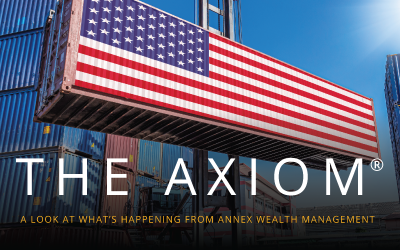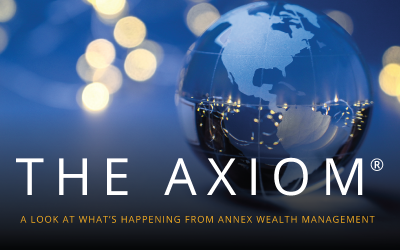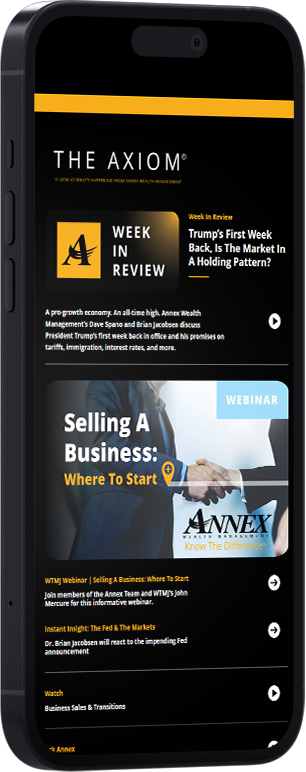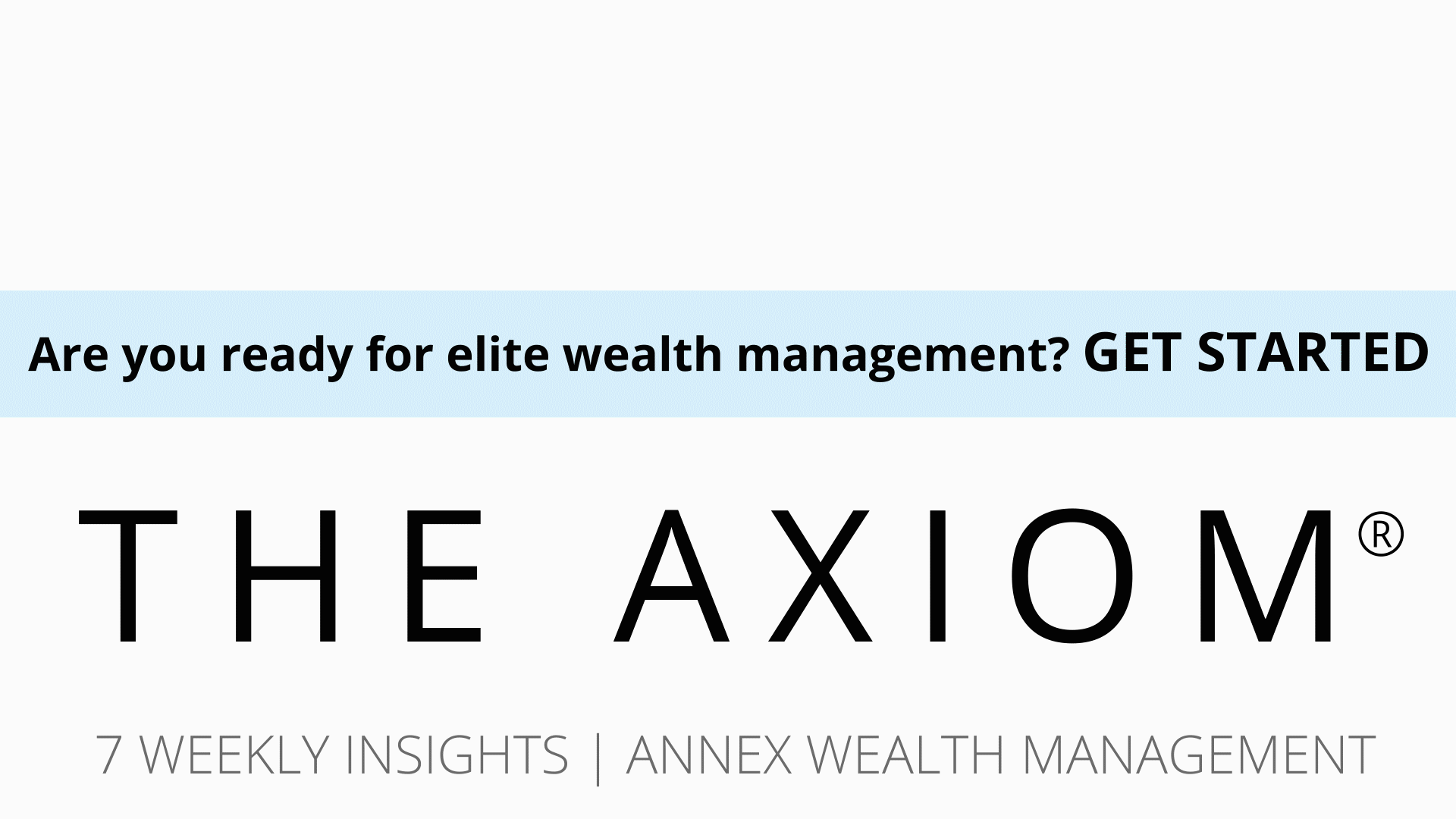
Axiom | Vol 251
Featured: Meet The Axiom’s Guest Editor: Matthew Morzy, CFP® | Inside: Markets, Fed See An Economy Ready To Come Back | Poll: Do You Think Bitcoin Is A Bubble? | MoneyDo: Make Sure You Have Core Estate Planning Documents | Ask Annex: Are There Any Downsides To HSAs? | DYADT: Does Your Advisor Educate You On Key Financial Topics? | The Pew Research Pandemic Social Media Survey | Coinbase Makes Nasdaq Debut | What’s A QDIA?
Oops! We could not locate your form.
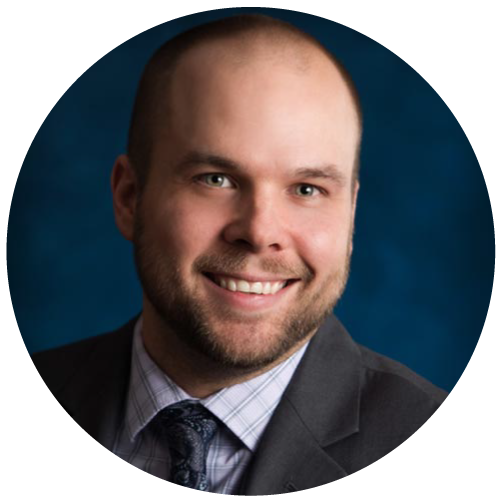
Meet The Axiom®’s Guest Editor: Matthew Morzy, CFP®
I’m Matt Morzy, Investment Team Manager at Annex Wealth Management.
My team works alongside our Investment Committee to provide research and assist in the management of our clients’ portfolios. As the manager, my main focus is improving the efficiency of implementing investment team strategy and the impact that strategy has to the broader aspects of our clients’ financial and tax planning.
My wife and I live in Waukesha, and we have our hands full with two wonderful little kids Levi (6) and Kennedy (3) – it has been a blessing to watch them grow up and develop their own unique personalities.
Receiving the Axiom every Sunday is one of my favorite parts of the weekend. We have so many talented professionals on the team and I learn something new every time.
BACK TO TOP ↑

Markets closed higher this week, riding indicators that the US economy is surging. Will the Fed intervene? Annex Wealth Management’s Dave Spano and Derek Felske discuss.
BACK TO TOP ↑

“I love telling people my opinion, so I don’t miss a chance to answer a poll. Looking back to see how others responded is always interesting as well.”
– Guest Editor: Matt Morzy, CFP® | Investment Team Manager
________________________________________
Do You Think Bitcoin Is A Bubble?
With prices still soaring and a major public offering hitting the market, some investors see the leading cryptocurrency as just a bubble, while others argue the opposite.
Oops! We could not locate your form.
BACK TO TOP ↑

“Reading each weekend’s MoneyDo is always a good reminder on items that I need to make sure I’m attending to in my own financial plan. Although I’m a CFP®, I can still benefit from a good refreshing on certain topics that I don’t focus on in my day-to-day role – such as Estate Planning. I may be biased, but the Investment related MoneyDos are always a good read.”
– Guest Editor: Matt Morzy, CFP® | Investment Team Manager
________________________________________
Make Sure You Have Core Estate Planning Documents
No comprehensive financial plan is fully complete without an estate plan. Estate planning is important for everyone, regardless of net worth, because it involves specifying your wishes and who you want in control, both in the event you are unable to manage your own affairs, and at the time of your death.
Estate planning also makes it easier for your loved ones to administer your affairs – and likely will save them some significant legal fees.
This week’s MoneyDo: make sure you possess these critical Estate Planning documents:
- Power of Attorney for Finances and Property, also known as a Durable Power of Attorney or Financial Power of Attorney. The Durable Power of Attorney names an individual to act on your behalf during your life, as it relates to your finances and assets. This often gives the power of attorney the ability to file tax returns on your behalf; apply for Medicare, Medicaid, Social Security and other government benefits; pay your bills and access your financial accounts. If you were to become incompetent without a Financial Power of Attorney in place, a court-supervised guardianship would be required for someone to be able to manage and take care of your finances.
- Power of Attorney for Health Care names someone to make health care decisions if you are unable to make those decisions yourself. It also gives you the opportunity to give direction to that individual if various medical situations arise.
- Last Will and Testament is the primary document that will provide how assets titled in your individual name without a joint owner or beneficiary will be distributed. Your Will also appoints an executor responsible for managing your estate and following your final wishes. If you have minor children, your will can also nominate a guardian to care for them. Assets distributed under a Will go through the court supervised, probate process.
Once you have assembled those key pieces, estate planning can and often does include additional documents depending on the nature of your assets and family situation.
- Revocable Trust, also known as a Living Trust, can be used in conjunction with a Will and become the primary mechanism to distribute assets outside of the probate process. A trust allows for continuity of management during life and after death as the trust continues automatically without having to wait for the court to appoint an executor. An important decision to make in the planning process will be naming a successor trustee to provide for a smooth transition and continuity in management of the trust assets upon your death or incapacity.
- Marital Property Agreement is an additional document that can be used in estate planning that classifies property owned as either individual or marital property. Classification of property can have an impact on how an estate plan flows when individuals pass away. A primary advantage to using a marital property agreement is that it can also be used to help avoid probate.
All five of these documents are used regularly as part of a comprehensive estate plan, in conjunction with beneficiary designations.
Beneficiary Designations, Transfer on Death Provisions and Asset Titling are also important components to ensure the estate plan you have designed will be effective and easy to administer when you pass away. Beneficiary designations, transfer on death provisions and joint accounts will pass automatically according to the terms of the account rather than under the terms of your Will or Trust. When developing your comprehensive estate plan, it is important to review and update all your accounts to fit.
BACK TO TOP ↑

This week’s Ask Annex comes from Steve, who asks:
“My company is starting an “HSA” health savings account. The company will contribute up to $1000. The contributions we add will be tax free, which is good. What I was wondering is, is there any downside to HSA’s going into retirement in approximately 6 years?
Like using it in combination with cobra or another gap insurance? What happens to the monies in the account if you die? How much money should a person put in the account?”
___________________________
We asked Annex Wealth Management’s Ron Johnson, CFP®:
Thanks for your question. Health savings accounts (HSA) offer excellent tax advantages. Often referred as triple tax advantaged because
- HSAs receive pre-tax contributions
- HSA growth is tax deferred
- If used for qualified medical expenses, HSA withdrawals are tax free
The rules allow a taxpayer who has an HSA qualified health plan to contribute up to $7,200 if they have a family plan or $3,600 if they have an individual plan. Once the taxpayer reaches age 55, then another $1,000 can be contributed as a “catch up contribution.” The taxpayer’s spouse can also contribute $1,000 to a separate HSA once they turn 55. Keep in mind, these limits also include employer contributions.
The really intriguing part to the HSA is the accounts are portable and balances rollover from year to year. You, the taxpayer, have the opportunity to let the balance in the HSA grow each year and use the account to fund health expenses in retirement.
Tax-free distributions can be used to cover qualified medical expenses such as deductibles, co-pays, prescription drug expenses, COBRA premiums and Medicare premiums. Non-qualified distributions are subject to ordinary income tax rates and a 10% penalty until the taxpayer reaches 65 when the penalty no-longer applies.
When the HSA owner dies, a surviving spouse can assume the HSA as their own. However, any other beneficiary will not enjoy continued tax benefits of the HSA. The balance in the account will be treated as a taxable distribution to any non-spouse beneficiary in the year the taxpayer dies.
We hope this helps and let us know if you have other questions.
BACK TO TOP ↑

Does Your Advisor Educate You On Key Financial Topics?
Our Youtube channel has hundreds of videos on key topics that educate and inform. It reflects our heart for education and information – trying our best to help you grow and understand components of wealth management and the markets.
A Wide Variety Of Topics
One of our core missions is to educate and increase financial awareness. Browse some of our curated playlists:
SPORTS
TRAVEL
ECONOMY
SOCIAL MEDIA
JOBS
HOUSING
TAXES
DEFINITIONS
MORE…
BACK TO TOP ↑


“One of the areas that I think sets Annex apart is our wonderful marketing team. The videos that they put together on a daily basis are phenomenal. I love watching the videos that go along with the radio clips or YouTube videos. They’re able to illustrate complex topics in a way that helps breakdown the information in an easy to understand way.”
– Guest Editor: Matt Morzy, CFP® | Investment Team Manager
KNOW THE DIFFERENCE MINUTE:
The Pew Research Pandemic Social Media Survey
KNOW THE DIFFERENCE MINUTE:
Coinbase Makes Nasdaq Debut
WHAT’S THAT?
What’s A QDIA?
BACK TO TOP ↑

Annex Wealth Management provides free workshops, open to the public, on key wealth management topics.
Each week, we provide links to register for upcoming events.
BACK TO TOP ↑




